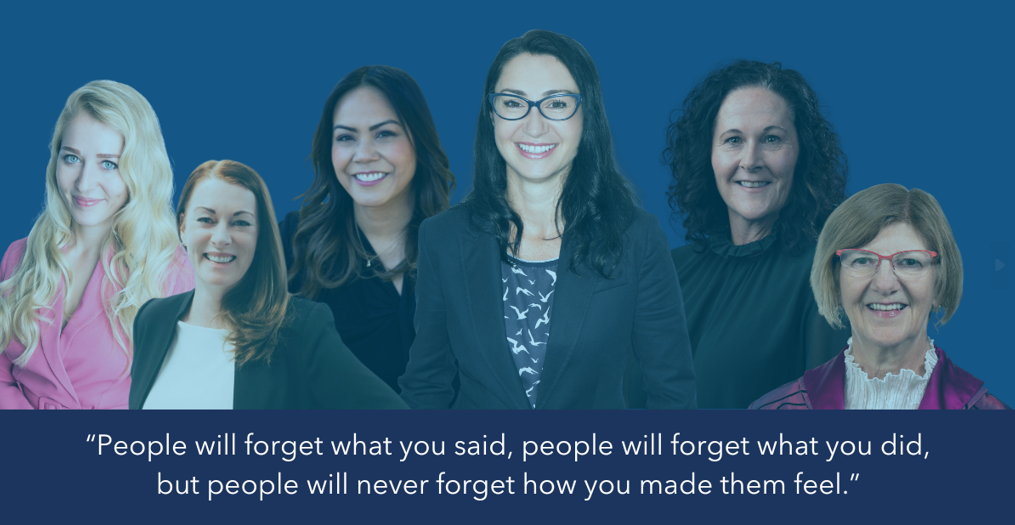The theme for International Women’s Day this year was “Invest in Women: Accelerate Progress”. According to the Government of Canada “it is a call to action and a reminder that gender equality is one of the most effective ways to build healthier, more prosperous, and more inclusive communities. We all have a role to play in building a future where everyone can reach their full potential. It is time to act – because women’s success is everyone’s success.” 1 While it is also Women’s History Month in the United States, but we decided to utilize the momentum to feature women within our community who have been contributing to the success of the HR profession.
We are honoured to work alongside many of these individuals and to be a part of their story. Read on to learn about their experience, the advice they have for aspiring young women and quotes they live by.
Ioana Guirca – CEO, CPHR Alberta
Experience in Leadership as a Woman
“My journey into leadership has been a blend of experiences, opportunities, and leaders that inspired me along the way. I am immensely grateful for every aspect of my journey that has helped me grow and shaped me into the person I am today. I cherish the valuable lessons learned from the exceptional leaders I’ve had the privilege working with in my professional journey, as well as the challenges that have strengthened me. Each experience, whether smooth or challenging, has contributed to my growth, and I’m a true believer in always being open to learning.”
Advice for aspiring young women
“Prioritize a practice of self-care and self-appreciation. I firmly believe that caring for oneself is the foundation for caring for others effectively. Seek out the positive aspects in every situation and don't hesitate to express them openly and confidently.”
Favourite Quote
“I’ve learned that people will forget what you said, people will forget what you did, but people will never forget how you made them feel.”
-Maya Angelou
Lisa Watson – CPHR Alberta Board Chair
Experience in Leadership as a Woman
“Early in my career, I had few female mentors and was often the only woman on the leadership team in male dominated industries. As a young lawyer, I was told by a judge in court that they would not listen to me if I was wearing pants. I struggled balancing my family commitments with 7:30am meetings when I was dropping kids off at daycare. Flexibility and balance were unspoken, and I thought that the only way to get ahead was to act like a man. Things couldn’t have been further from the truth. After seeking out female mentors and observing the great qualities of amazing leaders, I learned to lean in to being a woman in leadership, and to demonstrate strength with grace and kindness, and to leverage the diverse perspectives of everyone at the table, male or female. Flexibility, inclusion and belonging are now important topics of conversation, and progress has occurred, albeit slowly, and further progress is required to support women in the workplace and truly leverage the great strengths and attributes that they contribute to an organization’s success.”
Advice for aspiring young women
“Lean in to your career. Re-imagine work experiences and opportunities as a jungle gym rather than a ladder. Take risks and try new things even if they scare you. Be curious, ask great questions, listen more and speak less. There is no such thing as work-life balance – it is all life. Don’t get so busy making a living that you forget to make a life. Get over the guilt of being a working parent, or prioritizing your personal life. Surround yourself with champions, both men and women. Be kind – to others and to yourself.”
Favourite Quote
“A brave leader is someone who says I see you. I hear you. I don’t always have the answers, but I’m going to keep listening and asking questions.” - Brene Brown
Karen Krull – HR Leader, CPHR Alberta Board Director
Experience in Leadership as a Woman
“It's been highly rewarding to grow to a senior executive level and it's not been a solo accomplishment. I've had many mentors and leaders who have contributed to my path, many incredible teams that climbed mountains with me, and my family, who has supported me. Leadership isn't a journey that takes a straight line, either. As a female, taking time off for a family and parenting two kids with disabilities, it's been a challenge at times. However, these aspects of my life have also made me a better leader, with deep empathy, and a focus on equal access to opportunity for all. I now see that my life's work is to remove barriers to success, and it's because of my kids that I have this focus.”
Advice for aspiring young women
Be true to yourself, even when it's hard. When you try to fit into a culture or organization that doesn't align with your values, it shows in the work, it shows in your resiliency, and it can take a toll on your health. When you have the alignment of your values and your work, it's where you can shine and elevate others. Don't be afraid to ask for help, reach out, be open to feedback, and take advantage of the lessons others have. I'm learning so much from HR professionals who are new to the field, they have tremendous insight and passion for HR - it's immensely energizing.
Favourite Quote
“People will always remember how you made them feel, not what you did.”
Katherine Salucop – Executive Director, Human Resources Division with Edmonton Police Service,
CPHR Alberta Board Director
Experience in Leadership as a Woman
I have worked in the HR profession for twenty years, in progressively responsible roles, moving from an individual contributor into senior level leadership roles. My experience extends to both public and private sector, where, like many organizations, have a much larger proportion of male to female employees… this disparity has been particularly true as I moved into more senior level roles. I was fortunate throughout my career to find myself working for or alongside some strong women in leadership roles who I could learn from. Watching them in action was a great way for me to understand and learn how to navigate not only the dynamics of increasing leadership responsibility, but also the nuances that come with being someone who brings a unique or different perspective to the table. I both saw and experienced how those differences can both be appreciated or viewed negatively.
Advice for aspiring young women
It take self-confidence and courage to show up at the table authentically when you may feel a need to fit a mold or standard. As a woman, including as a leader, I had to fight my own inner self talk. Fortunately, I had supporters and champions around me who pushed me to lean into my strengths and truly show up as the leader that defines me today. I have also been fortunate to have worked with leadership teams that have valued different perspectives, encouraged authenticity, and given space to put my strengths to use. As a woman, I have been branded with labels throughout my career that appeared on the face to be negative – too soft, too empathetic, too emotional, too direct, too driven. What I’ve come to learn is that these qualities, while viewed by some as negative, are the same qualities that have also enabled my success as a woman in the workplace. Because of the supporters around me, I found the might to own my story, and show how those characteristics are truly my strengths – I am compassionate, I am empathetic, I am sensitive to emotions, I have conviction, and I am action oriented. My advice for women is to support one another and be one another’s champion. If we can celebrate each other’s accomplishments and hold each other up so we have space to show up authentically, we can achieve so much more in our seats at the table.
Favourite Quote
“Grit is passion and perseverance for very long-term goals. Grit is having stamina. Grit is sticking with your future, day-in, day-out. Not just for the week, not just for the month, but for years. And working really hard to make that future a reality. Grit is living life like it’s a marathon, not a sprint.” – Angela Duckworth
Landis Jackson, CPHR, SHRM-SCP, Program Chair, Bow Valley College,
CPHR Alberta Board Director
Experience in Leadership as a Woman
“Throughout my leadership experience, I have gathered a village of support. This village has offered genuineness in their feedback – challenging me when needed, celebrating successes, and listening when I needed an objective ear. I have sought organizations that align with my values and are committed to developing their people while progressing in my career. While in leadership roles, I have intentionally hired people with different strengths who believe in collaboration. I have found great things happen in this environment. The respect that I hold for each team member is evident through my words and actions. Ethical behaviour, active listening, driving results while bringing laughter in the workplace are my personal best practices.”
Advice for aspiring young women
“Be authentic, bring your whole self to every situation, ask questions, and discover your purpose.”
Favourite Quote
“Success isn’t about how much money you make; it’s about the difference you make in people’s lives.”
- Michelle Obama
Svetlana Miftahov-Rapoport – Business Instructor, CPHR, 2023 Runner-Up for CPHR Alberta's HR Educator Award
Experience in Leadership as a Woman
"Throughout my career, I’ve had formal and informal leadership roles. But what I have truly learned is that what matters the most is our ability to lead with our passion, to lead with our purpose, to lead with our WHY.
Today, social media is bursting with never-ending quotes about leadership, and while many of them are truly inspiring, none of it matters without our intentional actions to lead. Leadership starts with the right mindset. As the famous quote goes “Whether you believe you can or you can't you are right.” I used to believe I could only lead and make a difference if I had a certain title. I also learned how fundamentally incorrect this belief is. A certain title would indeed give you more chances to have a seat at the decision-making table. But simply having a seat at the table is not enough. What truly matters is your passion for excellence and making a difference, and this is a skill, a muscle that requires discipline and hard work. To grow your leadership muscle, you must believe that you can! Your words and opinions matter and have value. Voice them, share them, and don’t stay in a shadow waiting for your “big boss title.”
Today, I lead by inspiring my students to grow personally and professionally; I lead by mentoring young professionals to start their careers; I lead by working with likeminded people to make education fun and valuable; I lead by advocating for neurodiversity in the workplace and voicing my ideas and opinions by speaking at conferences and writing articles; I lead by sharing my knowledge and experience with others; I lead by learning and developing myself every day; I lead by being authentic at all times. And you can too!"
Advice for aspiring young women
"I truly believe that the way to live a happy, fulfilling life is to know your WHY! As Simon Sinek describes it, your WHY is “the compelling higher purpose that inspires us and acts as the source of all we do.”
However, finding your WHY is easier said than done though. There are so many obstacles we (especially women) face in search of our WHY. Societal norms and expectations, stereotypical views, our own mental models… you name it.
My way to find it was to go back to my childhood and reflect on things that brought me pure joy. I asked myself what was my favourite playtime when I was little before society told me what I could and couldn’t do, what I should and shouldn’t be.
When I think about my childhood, my favourite game was teaching. I played in school with my dolls, family, and friends. I would spend hours creating lesson plans, activities, and reward cards for them. But as I can see now, what I mostly enjoyed in this process was interacting with people and observing the change in them. This reflection helped me to build my purpose statement, which is “to empower people to grow so that they can be fulfilled in their personal and professional lives.”
Today, when I look back at my professional experience, everything I’ve done so far was directly or indirectly related to teaching. I often say that my love for teaching brought me into the world of HR and HR brought me back into teaching.
I want to invite you to this beautiful journey and encourage you to take the time to look deep deep inside yourself. Your WHY is there, I promise. Just keep looking."
Favourite Quote
“The two most important days in your life are the day you are born and the day you find out why.”
Thank you to all these incredible women for sharing their experience, advice and for all that they do for our profession. We look forward to seeing what the future holds for them as they continue to thrive and inspire other women in our profession.
1
Canada, Women and Gender Equality. “Government of Canada.” Women and Gender Equality Canada, / Gouvernement du Canada, 8 Mar. 2024, women-gender-equality.canada.ca/en/commemorations-celebrations/international-womens-day/2024-theme.html.






